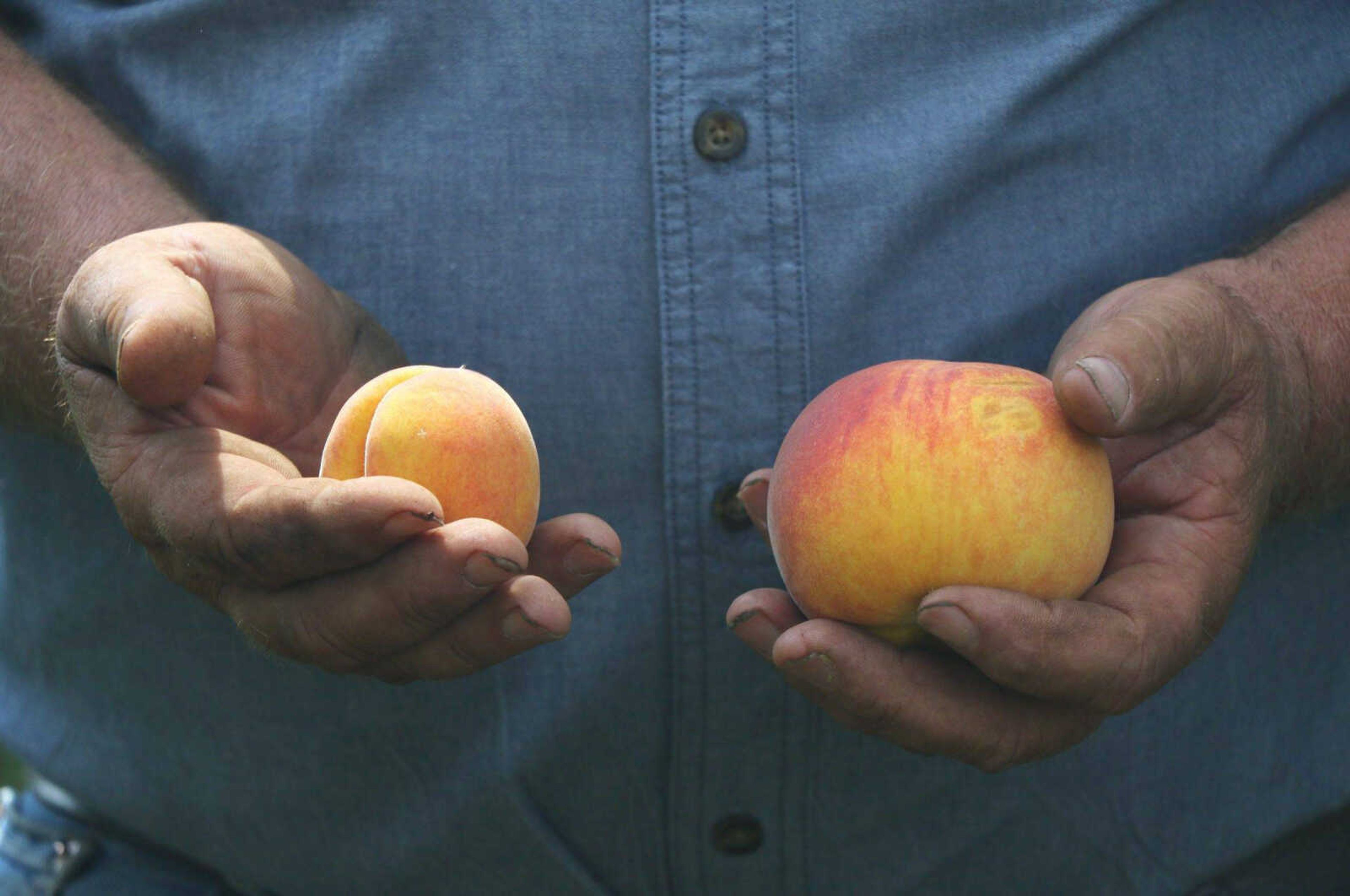Bader blames dicamba for drop in peach production
The Dunklin County farmer who alleges he is going out of business because of dicamba damage to his peach trees testified in Cape Girardeau’s federal court Wednesday morning that the herbicide was illegally applied to crops on neighboring farms, curtailing his peach yields and profits...
The Dunklin County farmer who alleges he is going out of business because of dicamba damage to his peach trees testified in Cape Girardeau’s federal court Wednesday morning that the herbicide was illegally applied to crops on neighboring farms, curtailing his peach yields and profits.
But in cross examination Wednesday afternoon, the lead attorney for Monsanto, which manufactures dicamba-based herbicides, pointed out numerous discrepancies between the farmer’s trial testimony and information he provided in earlier depositions.
Bill and Denise Bader own Bader Farms Inc. near Campbell, Missouri. They are suing Monsanto Co. and BASF Corp., claiming, among other things, the companies were complicit when they developed dicamba-resistant cotton and soybean seeds and did not intervene when the product was illegally sprayed in 2015 and 2016 during growing season.
At that time, the product was to be used only before and after growing season as a way to control weeds before row crops were planted. In his lawsuit, believed to be the first in the nation related to improper dicamba use, Bader asserts the herbicide drifted from adjoining farms, killing or damaging thousands of his peach trees.
Bader’s attorney, Bev Randles, questioned him for two-and-a-half hours about peach production at Bader Farms, said to be the largest producer of peaches in Missouri.
Bader testified that from 2002 through 2006, the farm’s annual peach harvest averaged 162,259 bushels. The following year, the crop was wiped out by an April frost and in 2008 the orchards were still recovering from the frost and the yield dropped to just more than 81,000 bushels.
Between 2009 and 2014 the Bader peach harvests ranged from a high of 93,231 bushels in 2009 to about 70,300 in 2014.
According to Bader’s testimony, he expected peach trees he planted in 2010 and 2011 to begin producing fruit and bump the annual yield to more than 100,000 bushels.
“Were you at 100,000 bushels-plus in 2015?” Randles asked.
“No,” Bader answered and said his peach harvest that year amounted to just more than 39,000 bushels and blamed the low yield on a combination of a hailstorm and herbicide overspray that drifted onto his trees in late June or early July that year. “In my 45 years in he peach business, I had never seen anything like it,” Bader told the jury and said he believed the damage was caused by dicamba.
The peach yield recovered somewhat in 2016 when Bader said he harvested 67,682 bushels despite what he believed was additional dicamba exposure.
“Everybody in Southeast Missouri was screaming about it, and I was, too,” he said.
Bader said he tried to deal with Monsanto and filed his lawsuit in Dunklin County in late 2016. It was later moved to federal court and BASF was added as a defendant in 2017.
By 2018, Bader said his peach harvest had fallen to 12,000 bushels.
“We’ve spent a chunk of money trying to keep our trees alive,” Bader testified. “We’re trying to support a business.”
“What do you see as the future of Bader Farms?” Randles asked.
“It looks almost nonexistent,” he answered.
In cross-examination, Monsanto attorney John Mandler quizzed Bader on several discrepancies between his courtroom testimony and video depositions recorded before the trial. Mandler also pointed to studies showing only traces of dicamba in Bader’s peach tree leaves along with heavier concentrations of other herbicides.
“This case boils down to whether there was any dicamba damage on the Bader farm, correct Mr. Bader?” he asked.
“Yes, sir,” Bader answered and admitted he has no “direct evidence” dicamba killed or damaged trees in his orchard.
He also admitted to sending invoices in 2016 amounting to more than $2.5 million to several of his neighbors, blaming them for dicamba overdrifts.
Bader subsequently admitted to the neighboring farmers he had “made a mistake” and he was “Just blowing off steam” by sending the invoices.
The trial is being heard before U.S. District Judge Stephen N. Limbaugh Jr. and is expected to last at least through next week.
Do you crave business news? Check out B Magazine, and the B Magazine email newsletter. Check it out at www.semissourian.com/newsletters to find out more.
Connect with the Southeast Missourian Newsroom:
For corrections to this story or other insights for the editor, click here. To submit a letter to the editor, click here. To learn about the Southeast Missourian’s AI Policy, click here.










